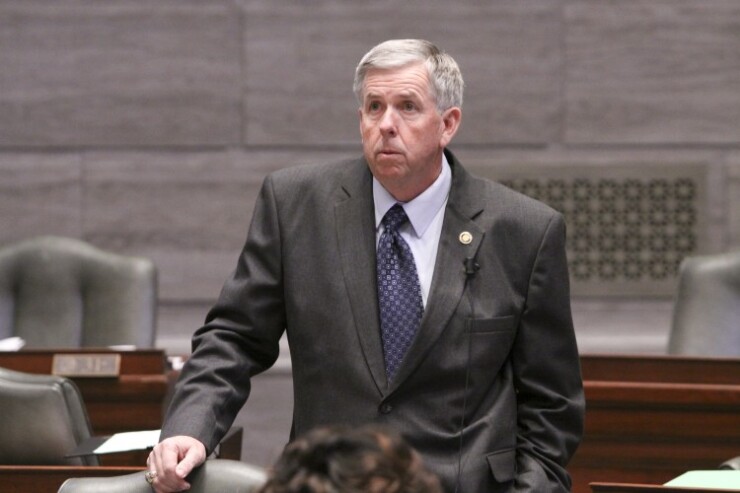The first phase of Missouri’s 12.5 cent motor fuel tax hike kicks into gear in October with the increase expected to eventually generate more than $450 million annually for local and state transportation projects.
State transportation proponents have long sought a steady stream of money to chip away at an estimated $8.25 billion, 10 year funding gap for projects dubbed “high priority” by the state. But they were stymied as lawmakers resisted the pressure and voters rejected ballot initiatives for decades.
Lawmakers

The legislation raises the current 17 cents per gallon motor fuel tax by 2.5 cents per gallon of fuel annually for five years beginning this fall. It’s projected to generate $330 million annually for the state’s road fund managed by the Missouri Department of Transportation with the remaining 30% going directly to cities and counties. All revenue raised by the tax hike must go towards roads, bridges and other transportation projects under the state’s constitution.
The expected revenue, however, hinges on how many state residents seek refunds and officials said they can’t yet predict the impact of an exemption from the increase that motorists can seek by submitting fuel receipts or other verification asking for a refund. A legislative fiscal note warned that in 2027, refunds could range from a low end of $58 million to a high end of $390 million.
The tax hike has no impact on MoDOT’s fiscal 2022 budget. “The increase in the motor fuel tax increases our capacity, but has not yet modified any of our plans,” said Brenda Morris, MoDOT’s chief financial officer.
The department — which issues through the Missouri Highways and Transportation Commission — is planning q $100 million issue in November that would
“Our current financial forecast which does not include the increase in motor fuel tax includes a $500 million amendment 3 bond issue in fiscal year 2023,” Morris said. The agency also continually eyes refunding opportunities but Morris said none are expected in the near future.
The department’s
The current motor fuel tax of 17 cents per gallon — which is one of the lowest nationally — generated $699 million in fiscal 2020.
Earlier this year, Fitch Ratings affirmed the highways commission’s AAA ratings senior state road bonds and AA-plus on subordinate liens and federal grant-backed bonds. The outlook is stable.
Parson also recently signed the state’s $35.3 billion budget package into law for the fiscal year beginning July 1. It doesn’t incorporate the state’s share of $2.7 billion in expected aid from the American Rescue Plan signed in March. Parson said he would lay out early next year how he thinks the state should use the relief.
The state holds a tight leash on borrowing but a roughly $60 million appropriation-backed deal is authorized to fund state park improvements. The deal will sell competitively in August or September through the Board of Public Buildings, according the state’s debt manager Stacy Neal, director of Accounting for the Office of Administration.
The state
Revenue of more than $11.2 billion for fiscal 2021 rose by nearly 26% over fiscal 2020 collections of $8.93 billion and exceeded the previous high of $9.6 billion for fiscal 2019, budget director Dan Haug announced.
Individual income taxes rose 28% to $8.92 billion while sales and use taxes rose 6.7% to $2.43 billion and corporate income taxes rose 72% to $797.1 million. All other collections rose by 13 % to $593.5 million.





